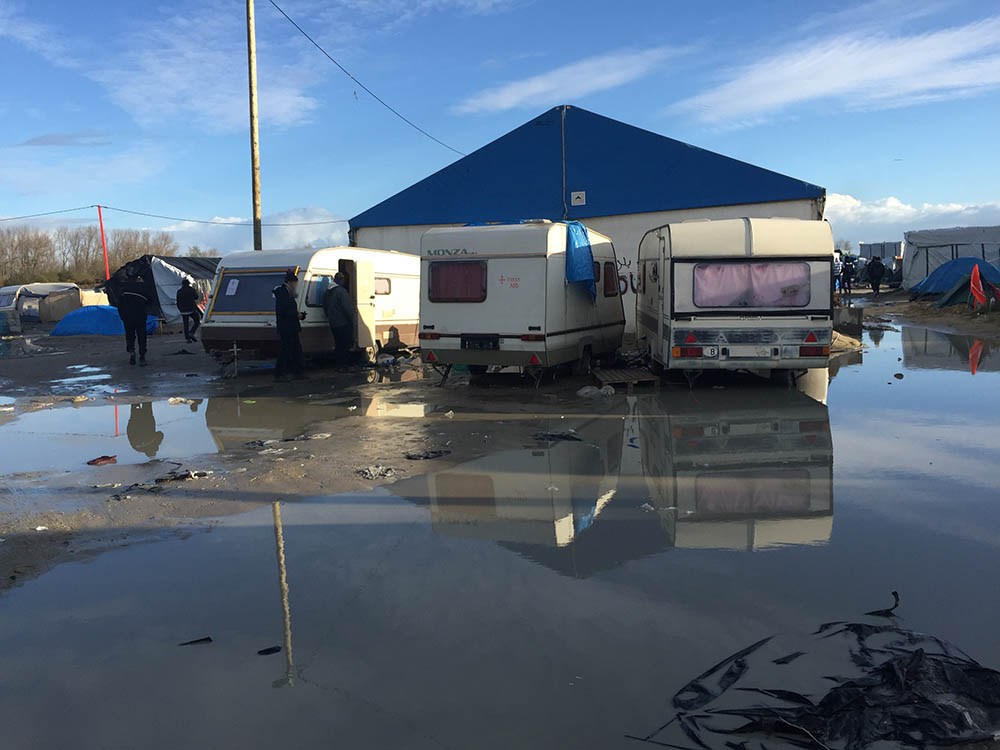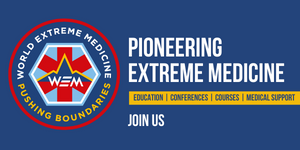Morven Telling / GP and Bryony Corbyn / Psychiatric Registrar
The Refugee Crisis may come to be seen as one of the defining human events of the 21st century. Desperate people are living in appalling conditions on our doorstep. As medics, we are in a position to help, through donating our skills, our voices, our money and our time. UK Doctors Morven Telling and Bryony Corbyn travelled to Calais and Dunkirk to offer what assistance they could to those in dire need – the experience was overwhelming. Their account here is particularly moving, and they also provide links for those looking to help, and those looking to donate.
As our train emerged through the Eurotunnel that links Dover and Calais, row upon row of high barbed wire fences came into view. Scraps of material tangled in between them; tattered reminders of the desperate attempts of people risking their lives as they try to reach the UK. We were on our way to two of the largest refugee camps in North West France: the Jungle Camp in Calais and the second in Dunkirk. Our trip had been planned spontaneously and in haste. We’d heard and read about the appalling conditions faced by refugees at our coastal border, just a few hours away from the warmth and safety of our own homes. It had been so difficult to imagine. Dismayed by the inaction and lack of official intervention surrounding this evolving humanitarian crisis, we decided to go and offer whatever aid we could. In the week before leaving, we contacted long-term volunteers though online social media groups and arranged a plan to divide our time between both camps. We would be attending to the medical needs of the thousands of refugees who would have very limited or no access to any other form of medical care during the time that we would be there. We anticipated the worst, knowing that these camps currently accommodate deeply traumatised individuals suffering exhaustion, malnutrition, infectious diseases and injuries, as well as a wide range of chronic health conditions. We were aware that their burden of suffering is far reaching, with physical and mental health problems accumulating during the traumatic journeys they endure: fleeing from their home countries, travelling long distances under stressful and harrowing circumstances before reaching the camp and enduring the desperate conditions that they now survive in. We hoped that between us, our skills as a general practitioner and psychiatric registrar would enable us to offer some aid and support.
Kit
We drove first to a warehouse where many of the donations sent to Calais are organised and sorted by volunteers. There we assembled a make-shift set of medical kits from shelves stacked with a random selection of donated supplies. There was an eclectic selection of dressings, first aid supplies and over-the-counter medication. Four final-year medical students and another doctor with medical and surgical experience joined our team. In preparation for the cold and wet conditions, we put on thermals, waterproofs, wellies, high visibility vests and with all the kit we could carry packed into rucksacks, we set off for Dunkirk.
The Dunkirk Camp
Sleeting rain and driving winds set an expectation of bleak, dire conditions. However, nothing could have prepared us for the level of suffering and despair we witnessed as we approached the Dunkirk refugee camp. Ahead of us; a sea of ankle-deep, slippery, foul-smelling mud, deep puddles of dirty water filled with rubbish and hundreds of tents desperately anchored into ground that would not hold them. Many tents lay flattened in the mud. The rest were being buffeted by strong winds, their resilience frequently tested by the gusts. We looked around; grim faced men, crying toddlers, everything wet and sodden. Amongst the trees, desperate people seeking shelter from the howling wind and freezing rain.
So many tents, where to begin? A few volunteers could be spotted in the camp, distributing donations and preparing building materials. One of them, a fireman from Lancaster, came over. Identifying us as first-aiders, he asked us to prioritise the tents with babies and young children first.
The babies and children are hungry… the mums give the babies milk from cartons and they get sick. Some of them have fevers.
Dividing up, we all set off towards different areas of the camp. Morven was shown to the area of tents where young children were based. She crawled inside a succession of filthy, damp tents examining babies with fevers, coughs and vomiting symptoms and many small children including a sobbing three year-old girl with tonsillitis who had been crying in pain for two days, a 15 month old with profuse diarrhoea and a young boy with asthma who had been coughing for several weeks. Whilst attending to the children she was also approached by their families; a young mother with severe toothache, a woman with symptoms of a urinary tract infection, a man with abdominal pain lying huddled and groaning beneath his blanket and many, many more.
“The inadequacy of the situation was overwhelming”
Taking her stethoscope out of her rucksack, Bryony barely made it a few steps before being approached and then surrounded by numerous, distressed people asking for help. They pointed to their throats, mouths, limbs and stomachs. Others pointed to their soaking wet, broken shoes or thin jackets, hoping she might have dry clothing to offer. The inadequacy of the situation was overwhelming. She attempted to find a bit of dry space under the edge of a wooden shelter and indicated for people to try to form a queue.
The first person in the queue was a man from Kurdistan. He opened his mouth, wincing in agony and showed her his rotting teeth. He spoke a little English and she was able to give him some pain killers before having to tell him that she could not do anything else, there was no dentist coming today. Did she know when one would come? No, she didn’t even know if one would come.
By now her rucksack lay in the mud in front of her as she examined peoples’ chests, skin lesions and throats as best she could in the pouring rain. Her first patient agreed to stay and translate since many of the other refugees spoke no English at all. Pain killers, cough syrup, rehydration sachets and skin creams were handed out in small, rationed quantities; we had such limited amounts and they had to stretch a very long way.
Despite the clear inadequacy of what we could provide, we received smiles and thanks from all.
For the rest of that cold, wet afternoon, we slid around in the mud, trying to protect our medical kits from the rain as we were stopped wherever we went by people asking for help. We crawled into tents to dress wounds and assess ill children and adults until darkness began to fall. Exhausted and conscious that for safety reasons we needed to leave the camp before it got dark, we had to leave many people still unseen. We headed out of the camp, promising to return early the next day.
Fire in the Jungle
Overnight a fire broke out in the Calais camp – most likely started by a candle. A call at 2am from volunteers on site asked the medical team to remain on stand-by. A badly burned man had to be carried out of the camp by other refugees to an ambulance that apparently would not come into the camp. Many tents had been destroyed leaving several families with small children and babies completely homeless, desperately seeking shelter in the pouring rain.
With news of the fire, we changed our plans and headed out early to the Calais camp in order to offer first aid to those who might have been injured by the fire. This was our first sight of the “Jungle” – thousands of tents, as far as the eye could see, overflowing portable toilets, burst water pipes creating muddy lakes, cooking smells mixed with the stench of waste and sewage.
We made our way to the camp first aid centre – three small caravans stocked with limited medical supplies. The caravans were parked in ankle deep water, mud and waste which the fast-growing queue of refugees had to stand in while they waited to be seen. We worked in one caravan, another doctor worked in the second, the third caravan was locked as there was no-one to staff it. We knew that when we left, ours would also be locked as there were no other medics to replace us.
Over the next few hours, our skills and experience were stretched to their limits. Trying to assess and treat so many ill people with such limited facilities. No antibiotics, no effective medication to treat the serious infections and illnesses that we saw, no translator other than fellow refugees who spoke broken English, no access to running water.
The Return
Leaving the first aid centre to go back to the Dunkirk camp was extremely hard. We just could not get to the end of the ever-growing queue of sick people desperate for help. We spent the remainder of the day and the next going between Calais and Dunkirk, seeing as many people as we could, replenishing our supplies at the warehouse before heading out each time. Traveling back to the UK on our final day, in utter exhaustion, there was little we could say. The experience had been overwhelming. We had been tested to our limits.
We could not do enough.





